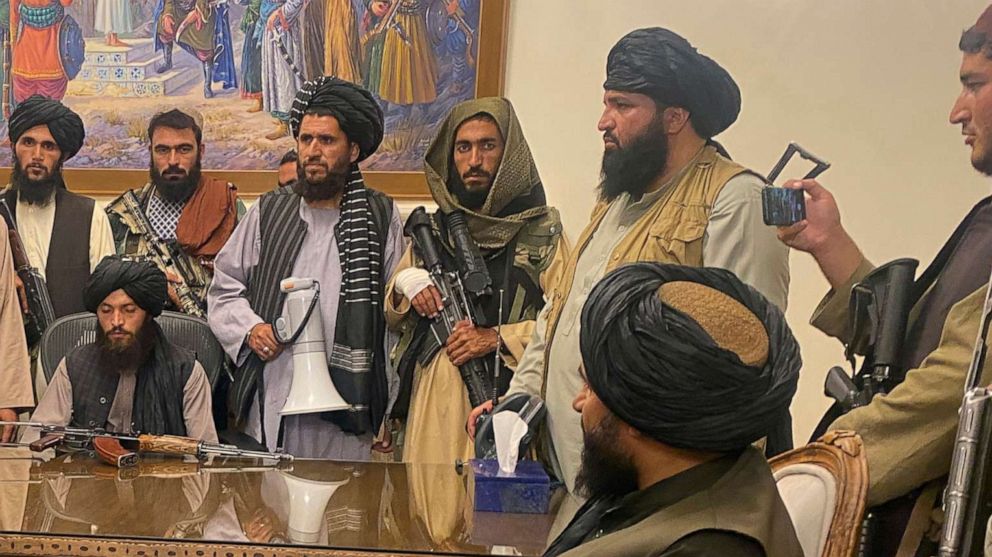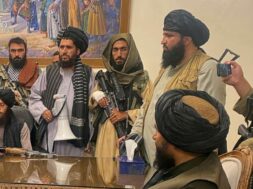
Taliban Ask Women Employees to “Stay Indoors till Security Gets Better,” China Opposes any Sanction against Taliban
Manas Dasgupta
NEW DELHI, Aug 24: Even as the Taliban asking the women employees of the Afghanistan government to stay home “till security gets better” in the country slowly revealing its anti-women face, the US Central Intelligence Agency (CIA) director William Burns held a secret meeting in Kabul with the Taliban’s de facto leader Abdul Ghani Baradar on Monday ahead of the G7 summit to discuss the Afghan issue, media reports said.
Addressing a press conference on Tuesday, Taliban spokesman Zabihullah Mujahid also reiterated that the US must complete its evacuation from Afghanistan by August 31–the date the Biden administration set for the withdrawal of all American troops. He also said that life was returning to normal in the country but chaos at the airport remained a problem.
Ahead of the virtual G7 meet on the Afghan crisis, China said the international community should support chances for positive developments in Afghanistan rather than impose sanctions on the Taliban. The Group of Seven leaders from Canada, France, Germany, Italy, Japan and the United States are due to hold a virtual meeting to discuss the situation arising after the Taliban’s takeover of Kabul.
In the first highest-level face-to-face encounter between the two sides since the militant group seized the Afghan capital, Burns met Baradar which came ahead of a warning from the UN Human Rights chief Michelle Bachelet of “credible reports” of “summary executions” and restrictions on women in areas under Taliban control. The Taliban, however, has denied both.
Burns’ secret meeting with Baradar was reported on Tuesday by the Washington Post stating that it came as efforts to evacuate thousands of people from Taliban-controlled Afghanistan became increasingly urgent. Burns is one of US President Joe Biden’s most experienced diplomats; while Baradar, who headed the Taliban’s political office in Qatar, is one of the top leaders in the regime that has taken power in Kabul.
A spokesperson for the CIA would not confirm the meeting saying that the agency “never discusses the director’s travels.” The Washington Post, which cited anonymous US sources for the meeting, did not the content of the discussions between the Taliban co-founder and the CIA boss.
But it said it was likely they revolved around any delay in the deadline for the United States to finish evacuations at the airport of the Afghan capital, where thousands of Afghans, terrified by the return of the Islamists, are still massed with the hope of fleeing the country.
Biden has set an August 31 deadline to finish the chaotic airlift organised by thousands of temporarily deployed US and UK troops, but has left the door open to an extension if needed. But a spokesman for the Taliban warned that the hardline Islamist group would not agree to any extension, calling the issue a “red line”, with any delay viewed as “extending occupation” and warned of “consequences” in over-shooting the deadline.
Bachelet while addressing the UN Human Rights Council on the “credible reports” of “summary executions” and restrictions on women in areas under Taliban control fueling fears of what their rule might hold a week before US forces are set to withdraw, urged it to take “bold and vigorous action” to monitor the rights situation in Afghanistan in the wake of the Taliban’s stunning takeover, as she sought to ensure that international attention on the country doesn’t wane.
Taliban leaders have promised to restore security and tried to project an image of moderation, but many Afghans are skeptical and are racing to the leave the country, leading to chaos at Kabul’s international airport. Amid scattered reports, it has been difficult to determine how widespread abuses might be and whether they reflect that Taliban leaders are saying one thing and doing another, or if fighters on the ground are taking matters into their own hands.
G-7 leaders plan to meet later Tuesday to discuss the burgeoning refugee crisis and the collapse of the Afghan government amid wrangling over whether the full US withdrawal of troops could be extended beyond the end of the month to allow more time to evacuate those desperate to leave.
In the meantime, tragic scenes at the airport have transfixed the world. Afghans poured onto the tarmac last week and some clung to a US military transport plane as it took off, later plunging to their deaths. At least seven people died that day, and another seven died Sunday in a panicked stampede. An Afghan solider was killed on Monday in a gunfight. On Tuesday, Bachelet called for strong action to investigate reports of rights abuses.
“At this critical moment, the people of Afghanistan look to the Human Rights Council to defend and protect their rights,” she said. “I urge this council to take bold and vigorous action, commensurate with the gravity of this crisis, by establishing a dedicated mechanism to closely monitor the evolving human rights situation in Afghanistan.” By “mechanism,” Bachelet was referring to the possibility that the council might appoint a commission of inquiry, special rapporteur or fact-finding mission on the situation in Afghanistan.
While advocacy groups like Human Rights Watch echoed such calls, a draft resolution at the council stopped far short of intensified scrutiny — and appeared to push back any deeper look at the rights situation until next year.
Bachelet cited reports of “summary executions” of civilians and former security forces who were no longer fighting, the recruitment of child soldiers, and restrictions on the rights of women to move around freely and of girls to go to school. She cited repression of peaceful protests and expressions of dissent.
Bachelet did not specify what time timeframe she was referring to or the source of her reports.
Days earlier, a Norway-based private intelligence group said it obtained evidence that the Taliban have rounded up Afghans on a blacklist of people they believe worked in key roles with the previous Afghan administration or with US-led forces. Several Afghans are in hiding, saying they fear such reprisals.
When the Taliban last ruled Afghanistan in the late 1990s, the group largely confined women to their homes, banned television and music, chopped off the hands of suspected thieves and held public executions. Bachelet noted that Taliban leaders have recently pledged to respect the rights of women, girls and ethnic minorities and refrain from reprisals.
The onus is now fully on the Taliban to translate these commitments into reality,” she told the 47-member-state council, which is the U.N.’s top human rights body.
Meanwhile, media reports said there were no requests from the UN Security Council Permanent members for the delisting of the Taliban’s top leadership from sanctions thus far, officials said here. They also refuted reports that the next meeting of UN’s 1988 Sanctions Committee, due next month, would lift restrictions on designated terrorists like Sirajuddin Haqqani and Mullah Baradar, both top Taliban leaders.
Sources said the next meeting of the Taliban Sanctions Committee, as the resolution 1988 committee is referred to, is due to be held in “mid-September” ahead of an important meeting to discuss the renewal of the mandate of the UN Assistance Mission in Afghanistan (UNAMA), which expires on September 17.
India’s Permanent Representative to the UN (UNPR), T.S. Tirumurti is the Chairman of the committee until December 31 this year, and is key to deciding the date of the meetings, and scrutinising requests to delist the Taliban leaders.
While diplomats from at least three countries, as well as MEA officials confirmed that there were no requests to de-designate or delist any of the sanctioned 135 individuals and 5 entities, they said a decision was likely to be taken on whether to extend the special travel exemptions given to 14 Taliban members to participate in the “peace and reconciliation efforts.” The meeting could also discuss whether to include other Taliban leaders in the exemptions, giving them permission to travel and access some funds, which are frozen at the moment.
The reports concerning Sirajuddin Haqqani are significant for India as he and the Haqqani group, founded by his father Jalaluddin Haqqani, are wanted for the Indian embassy bombings in 2008 and 2009 in which around 70 people, including the Indian defence attaché Brig. Ravi Datt Mehta and press counsellor V. Venkateswara Rao, were killed.
In November 2012, India was instrumental, as the then-President of the UN Security Council, in ensuring that the Haqqani group was designated as a terror entity. India had worked with several countries to ensure the group was banned, both in the UN’s 1988 sanctions committee list as well as the U.S., which designated it a Foreign Terrorist Organisation at the same time.
Sirajuddin Haqqani, deputy to Taliban chief Haibatullah Akhundzada, is now likely to have considerable influence in the next government in Afghanistan. His brother Anas Haqqani, who was arrested in 2014 for financing the group’s terror attacks, and was released as part of a hostage swap in 2019 from Bagram prison, is now one of the chief negotiators in government formation talks in Kabul.
In 1996, the last time the Taliban took power in Kabul, the UN had refused to recognise the regime, and had continued the Ambassador nominated by the previous Rabbani government. This time around, the UN would have to decide on continuing the accreditation with Ambassador Ghulam Isaczai who was appointed by the ‘Islamic Republic of Afghanistan’, given the Taliban control of Kabul, and its insistence on changing the country’s flag, and name to the ‘Islamic Emirate of Afghanistan.’
Officials point out that if the UN were to accept the new regime, which seems unlikely at present, it would give the Taliban the mandate to propose the delisting of its own members, as the Afghanistan UNPR is the “focal point” for the Sanctions list. Such a proposal would also run counter to the UN Security Council’s own statement on August 3 that firmly said members “do not support the restoration of the Islamic Emirate.”













